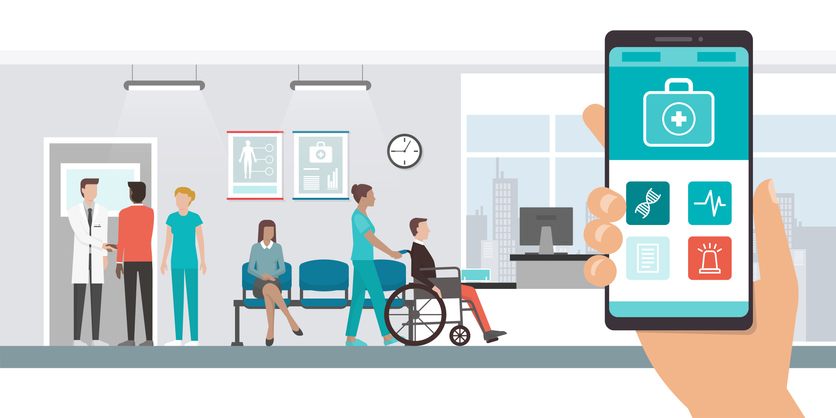
The mental healthcare system in the United States has failed Black people and people of color. It’s failing everyone who lacks privilege, and it’s failing those who don’t know to seek help for their mental health challenges.
The current system provides access to people of a certain socio-economic background – well to-do, employed and fully insured. This typically doesn’t include large populations of Black, Indigenous or people of color (BIPOC), though they experience mental health disorder rates similar to white people. Disparities that exist in services lead people of color to receive poorer quality of care and lack access to culturally competent care.

With the Rise of AI, What IP Disputes in Healthcare Are Likely to Emerge?
Munck Wilson Mandala Partner Greg Howison shared his perspective on some of the legal ramifications around AI, IP, connected devices and the data they generate, in response to emailed questions.
When you combine these decades-long systemic injustices, socioeconomic disparities, extremely limited access to affordable care, as well as communities that don’t have the resources to provide safe spaces, it’s not a hill to climb but a mountain. This doesn’t even consider finding a provider that looks like you, who can understand what you’re going through or where you’re coming from. These challenges make it next to impossible for someone to find affordable, accessible mental health care. That ‘impossible’ feeling leaves people less likely to seek treatment, less likely to find or access high quality care, and less likely to finish treatment. In fact, only one-in-three Black people who need mental health care receive it.
In my work, I’ve experienced first-hand the systemic challenges BIPOC patients experience when trying to access mental health care, and I’ve seen how lost patients get in the poorly conceived outpatient care system. This all contributes to a revolving door that sees people from underserved and overlooked communities walking in and out of hospitals and constantly falling prey to incarceration. We need to do better by these communities and start delivering affordable, high-quality and culturally-competent services to patients in need of care.
Acknowledging the problem
Before we fix these problems, we need to first acknowledge and address the issues that hold back BIPOC patients from seeking and receiving mental health care.
People struggling with their mental health in these communities often delay or avoid care altogether because of cultural stigma associated with mental health treatment. They end up struggling in silence until their condition becomes so severe that their first touchpoint of care is in the emergency room (ER) instead of with a counselor. Black people are especially likely to obtain health care from hospital outpatient and emergency departments.
When someone is experiencing mental health issues so severe that their cognition is distorted, they also may instead end up in the prison system. Symptoms of mental illness, particularly untreated schizophrenia and bipolar disorder, are closely associated with the same behaviors tied to substance abuse, which can easily lead to incarceration rather than treatment. Black people are overrepresented among persons subject to involuntary commitment and among persons admitted for inpatient psychiatric hospitalization. Through the use of emergency services, Black people with severe conditions are more likely to be incarcerated than people of other races.
There are also considerable gaps for populations in need of greater support, such as the unemployed, homeless and those living below the poverty line. Even if they do receive inpatient care, the outpatient process is so confusing and difficult that some patients may not know where to pick up their medications or understand how to take them. They might not be able to make it to a clinic every month for an injection either, as they may also be navigating housing instability or trying to figure out where their next meal will come from.
The focus becomes less on treatment than it is on removing a perceived problem or threat in many of these instances. Proper care, treatment and medication, when necessary, should be the outcome for those in need, but the resources needed for this type of approach are simply not there. However, with the proliferation in digital health services over the last few years, we as a healthcare ecosystem – and as a society – are becoming better equipped to address these problems at a systemic level, rather than just providing lip service to issues that have been persistent for decades.
Bridging the gap
We have a shared responsibility to design and execute programs that eliminate barriers for all patients, especially BIPOC patients, to ensure quality mental health care when needed. That responsibility extends to healthcare and digital health systems, politicians and government entities, and our communities at-large. With multiple stakeholders working together, we can create innovative solutions to help solve systemic issues and, ultimately, save lives.
Here’s how we can start to bridge the gap:
- At the community level: We need to start the conversation with patients at the earliest, lowest touchpoint possible to address cultural stigma. If a patient isn’t ready to see a therapist or engage in medication management yet, consider hosting an event with a mental health organization at the barbershop or church, where people can feel safe and comfortable and may be more open to learning about their options. For homeless patients, conversation should start at the shelter and food pantries with a focus on helping them find a stable housing situation before engaging in discussion about their mental health. These are fragile, sensitive conversations, but the sooner they happen, the sooner the pressure lifts for people to solve all their problems alone and at once.
- Within the healthcare and digital health ecosystem: While digital health systems have greatly expanded access to care, not everyone has internet access or owns a device, meaning telehealth and other digital solutions remain out of reach. These companies need to start accounting for the challenges all potential patients face when seeking help in their care models. Consider implementing low-cash payment models or offering services that (literally) meet patients where they are—having registered nurses visit patients in their homes, for example, can help remove barriers.
- Between the government and healthcare companies: Snowballing mental health issues within BIPOC communities always ties back to a lack of resources. Robust clinical programs and models within the healthcare system must connect to food and housing support programs through local government funding. Creating a connected ecosystem will start to chip away at challenges that influence high hospitalization and incarceration rates. Dedicating funding to fuel mental health care initiatives is how politicians and government entities provide support. While funding has historically flowed to non-profit organizations at both the federal and state level, it may be time to take a slightly different approach—one that helps bind for-profit or private entities with non-profit organizations to more seamlessly merge and launch programs that would better help any patient in need.
Fixing the mental health crisis is a long journey, but the first step is addressing the lack of resources and affordable access available to BIPOC and underserved communities, as well as the long-term implications that lack of services have on those patients.
People with mental illness have always been discriminated against. They have been denied full participation in society and labeled as dangerous and criminal. Many have been locked in institutions that acted more like prisons designed to punish than hospitals designed to treat them.
We need to do better, and now is the time for action.
Photo: SIphotography, Getty Images
Evans Rochaste is a board-certified psychiatric nurse practitioner and the founder and CEO of ReKlame Health. He witnessed the stark differences in the care available at New York’s hospitals when he was a psychiatric nurse at Northwell, Bronx Lebanon, and New York Presbyterian-Columbia. He also experienced the frustration of trying to get mental health services as a young Black man growing up in Brooklyn - stigma from loved ones to all services being out-of-network and costly and lack of Black male mental health providers for him to confide in. This experience inspired Evans to drive change in the behavioral health care system and to remove the stigma commonly associated with seeking mental health care while improving people’s lives through a holistic approach to medical treatment.














